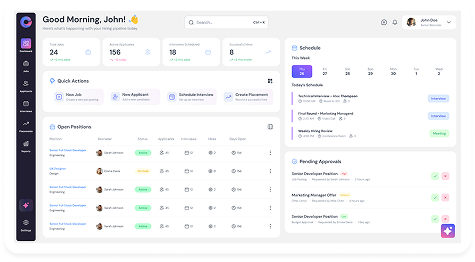The General Data Protection Regulation (GDPR) has fundamentally changed how businesses handle personal data. For recruiters and HR professionals, understanding these regulations is not just about compliance—it is about building trust with candidates and protecting your organization from significant financial penalties. This guide provides a clear overview of GDPR in recruiting and offers actionable steps to ensure your hiring processes are compliant.
Key Principles of GDPR
GDPR is built on several core principles that must guide all data processing activities, including recruitment. When handling candidate data, your organization must adhere to the following:
- Lawfulness, Fairness, and Transparency: You must have a lawful basis for processing candidate data, such as their explicit consent or a legitimate interest. The process must be fair, and you must be transparent with candidates about how their data is collected, used, and stored.
- Purpose Limitation: Data should only be collected for specified, explicit, and legitimate purposes. You cannot collect a candidate’s information for one role and then use it for unrelated marketing activities without separate consent.
- Data Minimization: Only collect and process data that is strictly necessary for the recruitment process. Avoid requesting excessive personal information that is not relevant to the job application.
- Accuracy: Personal data must be accurate and kept up to date. Implement procedures that allow candidates to correct or update their information easily.
- Storage Limitation: Do not keep personal data for longer than necessary. Establish clear data retention policies that define how long you will store candidate profiles and when they will be securely deleted.
- Integrity and Confidentiality: You must implement appropriate security measures, such as encryption and access controls, to protect candidate data from unauthorized access, loss, or breaches.
Practical GDPR Compliance Tips for Recruiters
Ensuring your recruitment process is fully compliant with GDPR requires a proactive approach. Here are practical tips to integrate these principles into your daily workflow:
- Obtain Explicit Consent: Before collecting any data, secure clear and unambiguous consent from candidates. Use checkboxes on application forms that are not pre-ticked and provide a link to your privacy policy.
- Update Your Privacy Policy: Your privacy notice must be easily accessible and written in clear language. It should detail what data you collect, why you collect it, how long you will store it, and who it will be shared with.
- Establish a Lawful Basis: Determine and document your lawful basis for processing data. While consent is common, “legitimate interest” can also apply, but you must be prepared to justify it.
- Implement Data Retention Schedules: Create a formal policy that dictates how long candidate data is stored. For example, you might decide to delete data from unsuccessful applicants six months after the position is filled.
- Honor Candidate Rights: Be prepared to respond to candidate requests regarding their data. Under GDPR, individuals have the right to access, rectify, erase, and restrict the processing of their personal information.
Boost Compliance with an ATS
Managing GDPR compliance manually is a significant challenge, especially for teams handling high recruitment volumes. An advanced Applicant Tracking System (ATS) can automate and streamline these processes to ensure you meet regulatory requirements.
Oorwin’s AI-powered platform is designed with GDPR in mind. It helps recruiters maintain compliance by:
- Automating Consent Management: Oorwin simplifies the process of obtaining and tracking candidate consent, ensuring you have a clear audit trail.
- Enforcing Data Retention Policies: You can configure automated rules to purge outdated candidate data according to your retention schedule, reducing compliance risks.
- Securing Candidate Data: With robust security measures, Oorwin protects sensitive information and helps you manage data access effectively.
By integrating a solution like Oorwin, you can focus on what you do best—finding and hiring top talent—while the platform handles the complexities of GDPR compliance.
Achieve and Maintain Compliance
GDPR in recruiting is more than a legal obligation; it is a critical component of building a trustworthy and reputable employer brand. By understanding the key principles, implementing practical compliance measures, and leveraging technology like Oorwin, you can navigate the regulatory landscape with confidence. This ensures your hiring process is not only efficient but also respectful of every candidate’s right to privacy.

